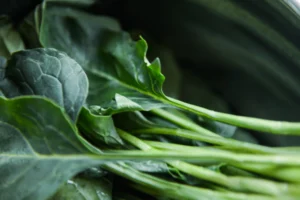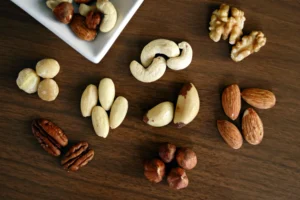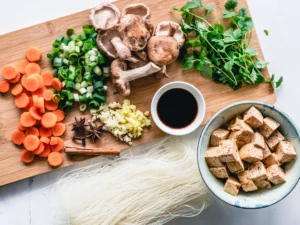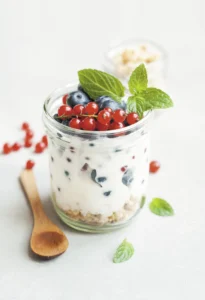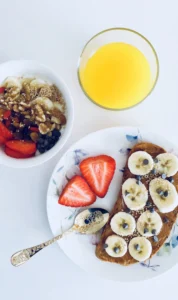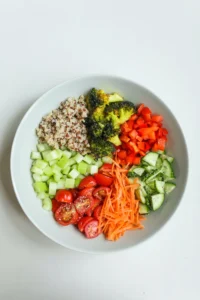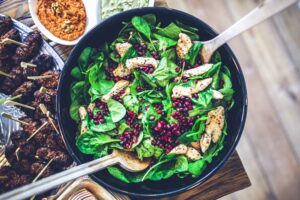Generated by Contentify AI
- Introduction to Vegetarian and Vegan Lifestyle and Nutrition: Overview of the Benefits, Challenges, and Necessary Changes
- Plant-Based Protein Sources: Exploring Legumes, Grains, Nuts, and Seeds
- Essential Nutrients for Vegetarians and Vegans: Vitamins, Minerals, and Antioxidants
- Cooking and Meal Planning for Vegetarian and Vegan Diets: Recipes and Tips
- Adopting a Vegetarian or Vegan Lifestyle: Making the Transition and Sticking with It
- Maintaining a Healthy Weight on a Vegetarian or Vegan Diet: Balancing Calories and Nutrients
- Conclusion: Benefits of a Vegetarian or Vegan Lifestyle and Nutrition
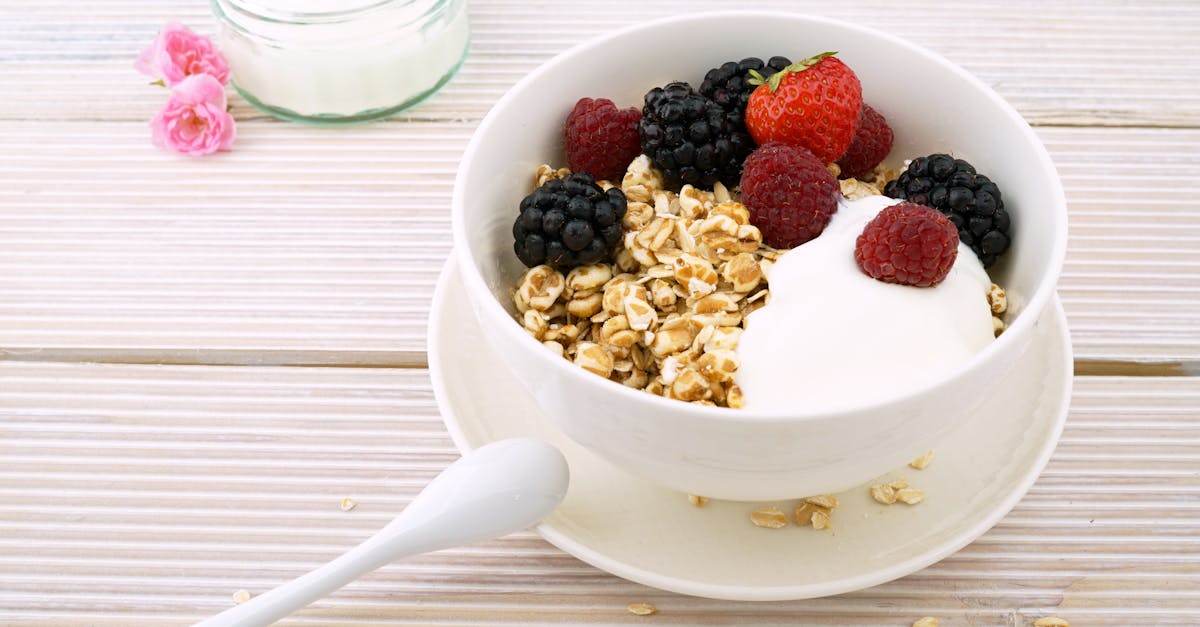
Introduction to Vegetarian and Vegan Lifestyle and Nutrition: Overview of the Benefits, Challenges, and Necessary Changes
Vegetarian and vegan lifestyle and nutrition are becoming increasingly popular as more and more people are realizing the numerous benefits vegetarian and vegan diets can offer. This section will provide an overview of the benefits, challenges, and necessary changes to undertake when transitioning to a vegetarian or vegan lifestyle and nutrition.
The Benefits of a Vegetarian or Vegan Lifestyle and Nutrition
One of the most significant benefits of a vegetarian or vegan lifestyle and nutrition is the positive impact it can have on your health. Studies have shown that a vegetarian or vegan diet is linked to a lower risk of heart disease, obesity, certain types of cancer, and even premature mortality. Additionally, vegetarian and vegan diets are typically rich in vitamins, minerals, and antioxidants, which can help to reduce inflammation and improve overall health.
The environmental benefits of a vegetarian or vegan lifestyle and nutrition are also considerable. A plant-based diet uses fewer resources from the environment – such as water, land, and energy – than an animal-based diet. This has a positive effect on the environment, helping to reduce greenhouse gas emissions, conserve water, protect endangered species, and reduce agricultural pollution.
The Challenges of a Vegetarian or Vegan Lifestyle and Nutrition
Although there are many benefits of a vegetarian or vegan lifestyle and nutrition, there are also some challenges that must be faced. For instance, transitioning to a vegetarian or vegan diet can be time-consuming and challenging. It is important to ensure that all of your nutritional needs are met, and in some cases, supplementation may be necessary. Additionally, it can be difficult to find vegetarian or vegan-friendly restaurants or meals when eating out.
It is also important to note that vegetarian and vegan lifestyles may require additional food preparation. This can include researching plant-based recipes, meal planning, and ensuring that you have access to the necessary ingredients.
Necessary Changes to Undertake When Transitioning to a Vegetarian or Vegan Lifestyle and Nutrition
When transitioning to a vegetarian or vegan lifestyle and nutrition, it is important to ensure that you are getting all of the essential nutrients your body needs. This includes protein, iron, calcium, vitamin B12, and omega-3 fatty acids. To ensure that you are getting the necessary nutrients, you should consider supplementing your diet with a vegan multivitamin or taking a B12 supplement.
In addition to supplementing your diet, it is important to ensure that you are eating a variety
Plant-Based Protein Sources: Exploring Legumes, Grains, Nuts, and Seeds
When it comes to plant-based proteins, there are so many options to choose from. Legumes, grains, nuts, and seeds are all great sources of protein for vegetarians and vegans alike. In this blog post, we will take a look at all four categories and explore which foods within each group are the best sources of protein for plant-based eaters.
Let’s start with legumes. Legumes are a type of plant food that are high in both fiber and protein. Common examples of legumes include beans, like chickpeas, black beans, and kidney beans; lentils; and peas, like split peas and black-eyed peas. All beans and peas contain protein, and some are higher in protein than others, so it is important to pay attention to the protein content of each legume you are consuming.
Grains are another great source of plant-based protein. Whole grains, such as quinoa, oats, wild rice, and wheat, are all excellent sources of protein. In addition to being high in protein, these grains also provide other important nutrients, such as fiber and B vitamins. It is important to note that refined grains, such as white flour, white rice, and white pasta, have significantly less protein than their whole grain counterparts.
Nuts and seeds are also great sources of plant-based protein. Nuts like almonds, cashews, and peanuts are all good sources of protein. Seeds like pumpkin, sesame, and hemp are also excellent sources of protein. Both nuts and seeds are also good sources of other important nutrients like magnesium, zinc, and healthy fats.
Finally, there are a few plant foods that contain unique proteins that must be mentioned. These include soy products like tofu and tempeh, and nutritional yeast. Soy products are made from soybeans, and are a great source of plant-based protein. Nutritional yeast is a type of mushroom that is high in protein and B vitamins.
These are just some of the plant-based sources of protein that vegetarians and vegans can enjoy. By including a variety of these foods in your diet, you can easily meet your protein needs without consuming animal products.
Essential Nutrients for Vegetarians and Vegans: Vitamins, Minerals, and Antioxidants
Vegetarian and vegan lifestyles have become increasingly popular with the rise of health-conscious people looking for sustainable eating habits, and the abundance of nutrient-rich plant-based foods available today. The key to maintaining a balanced vegetarian or vegan diet is to be aware of the essential nutrients that are not as easily obtained from plant-based sources as they are from animal products.
Vitamins are the most important nutrients to consider when planning a vegetarian or vegan diet. Most vitamins are found in plant-based foods, but some may not be as bioavailable as they are in animal products. Vitamin B12 is a notable example, since it is only found in animal products, making it necessary for vegetarian and vegan diets to include fortified foods or supplements to ensure adequate consumption. Other vitamins to consider include vitamin D3, vitamin K2, and iron.
Minerals are also essential in a vegetarian or vegan diet. Due to the fact that some minerals are not as bioavailable in plant-based foods, it is important to include a variety of sources in your diet. Iron, magnesium, zinc, and calcium are just a few examples of minerals that are found in plant-based foods, but may not be as easily absorbed as their animal product counterparts. Additionally, some minerals are bound to substances in plant-based foods that make them less bioavailable, so it’s important to be aware of food combinations that can help make them more accessible.
Antioxidants are also important in vegetarian and vegan diets, as they help protect cells from damage caused by free radicals. They can be found in a variety of plant-based foods such as fruits, vegetables, nuts, and seeds, and can help reduce the risk of chronic diseases such as heart disease and cancer.
By being aware of the essential nutrients in a vegetarian or vegan diet, you can ensure that you’re getting the nutrients you need for optimal health. Eating a balanced diet that includes a variety of plant-based foods and fortified foods or supplements can help you meet your nutritional needs.
Cooking and Meal Planning for Vegetarian and Vegan Diets: Recipes and Tips
Meal planning and cooking for vegetarian and vegan diets can seem daunting, but it doesn’t have to be. With some imagination and a few simple tips, you can create delicious, nutritious meals that are both satisfying and healthy.
Vegetarian and vegan diets often rely heavily on plant-based proteins. Beans, legumes, nuts and seeds are all great sources of protein. Incorporating these foods into your daily meals can ensure you’re getting all the essential nutrients your body needs.
When it comes to meal planning, start by selecting a few of your favorite recipes and build your meals around them. Incorporate a variety of vegetables, grains, and plant-based proteins into your meals. When it comes to meal planning, expanding your culinary horizons is key. Try to create meals with a variety of colors, flavors, and textures.
One of the most important tips for meal planning and cooking for vegetarian and vegan diets is to make sure you’re getting the right balance of vitamins and minerals in your meals. Eating a wide variety of fruits and vegetables, whole grains, legumes, and nuts and seeds will ensure you’re getting all the nutrients you need.
When it comes to cooking vegetarian and vegan meals, don’t be afraid to experiment with different spices, herbs, and flavorings. Adding some flavorful ingredients can turn a simple dish into a delicious and nutritious meal.
Finally, don’t forget the importance of planning ahead. Setting aside time to meal plan each week can make it easier to stick to your vegetarian and vegan diet. With just a little bit of planning and preparation, you can enjoy delicious meals that are both healthy and satisfying.
Adopting a Vegetarian or Vegan Lifestyle: Making the Transition and Sticking with It
Making the transition to a vegetarian or vegan lifestyle can seem like a daunting task. After all, it’s not just a change in the way you eat, but a complete overhaul of your diet and lifestyle. But with a little understanding and determination, you can make a successful transition and successfully maintain your new plant-based diet.
The first step to making the transition is to become informed. Educate yourself on the health benefits of vegetarian and vegan eating, such as lowered risk of diabetes, heart disease and some forms of cancer. Learn about the environmental impacts of eating a plant-based diet, including the potential to reduce your carbon footprint. Additionally, you should investigate which foods are part of a healthy and balanced vegetarian or vegan diet so that you can make sure you’re getting the nutrients your body needs.
The next step is to take it one meal at a time. Many people find that it’s easier to transition gradually, such as by eating one vegetarian or vegan meal each day. This allows you to slowly get accustomed to new flavors and ingredients while also allowing you to make healthier, more plant-based choices. Make sure to plan ahead, so that you’ll always have delicious vegetarian and vegan meals available.
Once you’ve gotten used to the basics of vegetarian and vegan eating, you can expand your culinary horizons by trying out new recipes and ingredients. There are countless creative and delicious meals that are part of a vegetarian or vegan diet. You can also explore other animal-free products, such as sustainable fashion and household items.
Finally, it’s important to remember that making mistakes is part of the process and that sticking with a vegetarian or vegan lifestyle is a long-term commitment. The key to success is to be patient with yourself and to remember that it takes time to adjust to a new way of eating and living. With enough dedication and support from your friends and family, you can make the transition to a vegetarian or vegan lifestyle and maintain it for the long haul.
Maintaining a Healthy Weight on a Vegetarian or Vegan Diet: Balancing Calories and Nutrients
Maintaining a healthy weight is a priority for most people, and it’s certainly possible to do this while following a vegetarian or vegan diet. Whether you’re trying to lose weight, maintain your current weight, or gain a few pounds, there are several important aspects to consider in order to achieve optimal success.
First, it’s important to understand that vegetarian and vegan diets tend to be lower in calories than diets that include meat, poultry, and fish. Therefore, if you’re trying to lose weight on a vegetarian or vegan diet, you’ll need to be mindful of the amount of food you’re consuming and be sure you don’t over eat.
Second, because vegetarian and vegan diets are generally nutrient-rich, it’s important to make sure you’re consuming the right balance of nutrients to meet your needs. While it’s important to focus on nutrient-rich foods like fruits, vegetables, whole grains, nuts, and legumes, it’s also important to include a variety of fortified foods to ensure you’re getting the nutrients you need from your diet.
Finally, be sure to stay physically active and engage in regular exercise. Exercise is an essential part of any healthy lifestyle and it can help you maintain a healthy weight while following a vegetarian or vegan diet.
By following these guidelines, you can enjoy the health benefits of a vegetarian or vegan diet while achieving and maintaining a healthy weight. Eating a variety of nutrient-rich foods, maintaining portion control, and engaging in regular exercise can help you reach your weight loss goals.
Conclusion: Benefits of a Vegetarian or Vegan Lifestyle and Nutrition
It is clear that a vegetarian or vegan lifestyle comes with a variety of health benefits. People who adhere to a vegetarian or vegan diet generally experience a lower risk of obesity, heart disease, and cancer, and are more likely to have a healthier body weight than those who don’t. Additionally, vegetarians and vegans typically consume more fiber, vitamins, and minerals than non-vegetarians, resulting in increased overall health. Finally, a vegetarian or vegan lifestyle may also be beneficial in terms of environmental sustainability, as fewer resources are needed to produce plant-based foods than animal-based foods.
The evidence is clear: a vegetarian or vegan lifestyle and nutrition plan can have significant health benefits. It can help you maintain a healthy body weight, lower your risk of chronic diseases, and provide essential nutrients. Plus, it can also help protect the environment. Whether you’re looking to transition to a vegetarian or vegan lifestyle or just want to add more plant-based foods to your diet, there are plenty of delicious and nutritious options to choose from. So, why not give vegetarian or vegan nutrition a try?
